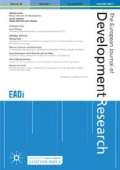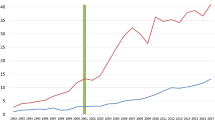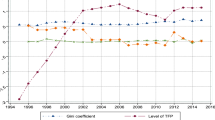Abstract
This article explores the extent to which trade might impact horizontal inequalities in Indonesia by focusing on a district-level cross-sectional analysis of the relationship between different export sectors and the extent of horizontal inequalities across three dimensions. Although the causal directionality is unclear, there is significant evidence of correlations between particular industries and particular dimensions of horizontal inequality. There is no single industry that is consistently correlated with horizontal inequalities across all dimensions, however; neither are the results consistent across urban and rural districts. The conclusion that we can draw from this is that although the export structure of the Indonesian economy does appear to have influenced horizontal inequalities this has largely been located within a very particular and localized political economy of migration and ethno-religious identities. It is not so much that trade has favoured particular groups bestowed with higher endowments of education or other resources.
Cet article examine dans quelle mesure le commerce peut influencer les inégalités horizontales en Indonésie, en s’appuyant sur une analyse sur trois dimensions, au niveau des districts, de la relation entre différents secteurs d’exportation et l’ampleur des inégalités horizontales. Si le sens de la causalité n’est pas clair, il est largement démontré qu’il existe des corrélations entre chaque secteur particulier et certaines dimensions de l’inégalité horizontale. Il n’existe cependant aucune industrie qui soit corrélée de façon constante aux inégalités horizontales dans toutes leurs dimensions. De même, les résultats varient entre districts urbains et ruraux. En conclusion: si la structure des exportations indonésiennes semble avoir conditionné les inégalités horizontales, ceci est largement lié à une économie politique très particulière et très localisée de migration et d’identité ethno-religieuse plutôt qu’au fait que le commerce ait favorisé des groupes particuliers dotés de niveaux plus élevés d’éducation ou autres ressources.






Similar content being viewed by others
Notes
Bahasa Indonesia is a standardization of the Malay dialects that have served as a lingua franca and trading language across the region since pre-colonial times. While belonging to the same broad Malayo-Polynesian language group, Javanese not mutually intelligible with Malay and is also grammatically complex and hierarchical (the different registers – equivalent to the use of vous and tu in French – constitute, in Javanese, completely distinct vocabularies).
References
Aspinall, E. (2002) Modernity, history and ethnicity: Indonesian and Acehnese nationalism in conflict. Review of Indonesian and Malaysian Affairs 36 (1): 3–34.
Asra, A. (2000) Poverty and inequality in Indonesia: Estimates, decomposition and key issues. Journal of the Asia Pacific Economy 5 (1/2): 91–111.
Barron, P., Kaiser, K. and Pradhan, M. (2009) Understanding variations in local conflict: Evidence and implications from Indonesia. World Development 37 (3): 698–713.
Booth, A. (2000) Poverty and inequality in the Soeharto era: An assessment. Bulletin of Indonesian Economic Studies 36 (1): 73–104.
Chauvel, R. (1990) Republik Maluku Selatan and social change in Ambonese society during the late colonial period. Cakalele 1 (1/2): 12–26.
Davidson, J. and Kammen, D. (2002) Indonesia's unknown war and the lineages of violence in West Kalimantan. Indonesia 73: 53–87.
Henley, D. (1993) Nationalism and regionalism in colonial Indonesia: The case of Minahasa. Indonesia 55: 91–112.
Hill, H. (2000) The Indonesian Economy. Cambridge,UK: Cambridge University Press.
Iqbal, F. and Rashid, F. (2001) Deregulation and development in Indonesia: An introductory overview. In: F. Iqbal and W. James (eds.) Indonesia's Trade and Investment Policy Experience: Distortions, Deregulation, and Future Reforms. Westport, CT: Praeger.
Kell, T. (1995) The Roots of Acehnese Rebellion, 1989–1992. Ithaca, NY: Cornell University Modern Indonesia Project.
Leith, J. (1998) Resettlement history, resources and resistance in North Halmahera. In: S. Pannell and F. von Benda-Beckmann (eds.) Old World Places, New World Problems: Exploring Issues of Resource Management in Eastern Indonesia. Canberra, Australia: Australian National University, Centre for Resource and Environmental Studies, pp. 113–142.
Liddle, R.W. (1996) The Islamic turn in Indonesia: A political explanation. Journal of Asian Studies 55 (3): 613–634.
Mancini, L. (2008) Horizontal inequality and communal violence: Evidence from Indonesian districts. In: F. Stewart (ed.) Horizontal Inequalities and Conflict: Understanding Group Violence in Multiethnic Societies. Basingstoke, UK: Palgrave.
Mancini, L., Stewart, F. and Brown, G.K. (2008) Why horizontal inequalities matter: Some implications for measurement. In: F. Stewart (ed.) Horizontal Inequalities and Conflict: Understanding Group Violence in Multiethnic Societies. Basingstoke, UK: Palgrave.
Purdey, J. (2006) Anti-Chinese Violence in Indonesia, 1996–1999. Singapore: Singapore University Press.
Rakindo, A. (1975) Indonesia: Chinese scapegoat politics in Suharto's ‘New Order’. Journal of Contemporary Asia 5 (3): 345–352.
Ravallion, M. (1988) INPRES and inequality: A distributional perspective on the centre's regional disbursements. Bulletin of Indonesian Economic Studies 24 (3): 53–71.
Reid, A. (2005) An Indonesian Frontier: Acehnese and Other Histories of Sumatra. Singapore: National University of Singapore Press.
Resosudarmo, B.P. (2005) The Politics and Economics of Indonesia's Natural Resources. Singapore: Institute of Southeast Asian Studies (ISEAS) Press.
Ricklefs, M.C. (2001) A History of Modern Indonesia Since c. 1200. London: Palgrave.
Sidel, J.T. (1998) Macet total: Logics of circulation and accumulation in the demise of Suharto's New Order. Indonesia 66: 159–197.
Tirtosudarmo, R. (1995) The political demography of national integration and its policy implications for a sustainable development in Indonesia. The Indonesian Quarterly 23: 369–383.
van Klinken, G. (2007) Communal Violence and Democratization in Indonesia: Small Town Wars. London: Routledge.
van Miert, H. (1996) The ‘land of the future’: The Jong Sumatren Bond and its image of the nation. Modern Asian Studies 30 (3): 591–616.
Wilson, C. (2008) Ethno-Religious Violence in Indonesia: From Soil to God. London: Routledge.
Woo, W.T., Glassburner, B. and Nasution, A. (1994) Macroeconomic Policies, Crises, and Long-Term Growth in Indonesia, 1965–90. Washington DC: World Bank.
World Bank (1994) Transmigration in Indonesia. Washington DC: Operations Evaluation Department, World Bank.
Author information
Authors and Affiliations
Rights and permissions
About this article
Cite this article
Brown, G. Trade, Employment and Horizontal Inequalities in New Order Indonesia. Eur J Dev Res 24, 735–752 (2012). https://doi.org/10.1057/ejdr.2012.29
Published:
Issue Date:
DOI: https://doi.org/10.1057/ejdr.2012.29




